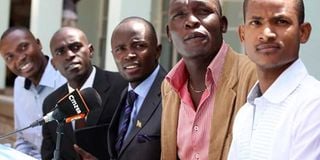The money and politics behind student unions

Public universities students leaders from left, Meshach Achola (Technical University), Maxwell Oloo (National Convener Kenya University Students Association), Lone Felix (Kenyatta University), Charles Juma (Maseno University) and Babu Owino (University of Nairobi) addressing the press at Technical University in Nairobi on April 21, 2104. PHOTO | BILLY MUTAI |
What you need to know:
- Election of officials is characterised by well-oiled and high profile campaigns
- Such is the fate of today’s university student politics.
- On March 2, Harun Odhiambo a student at Rongo University died after he fell into a 30 feet well while running away during a clash with police.
Soon after the stabbing of a student following a fracas between rival camps outside the University of Nairobi’s Vice Chancellor’s office last week, a fierce blame game as to which side was responsible erupted.
A television interview on NTV about the matter with Babu Owino and Dennis Njeru, the leading contestants for the Students Organisation of Nairobi University (Sonu) chairperson was cut short after it turned chaotic.
The two nearly traded blows on live television after Babu in an effort to undercut his rival presented transcripts showing that he had consistently failed his exams and forced to repeat second year a number of times.
Such is the fate of today’s university student politics. Unlike the student unions of yesteryears, the unions this are abrasive, tribal affairs characterised by well-oiled and high profile campaigns.
This month alone, one student has died and two stabbed in election-related violence and being the poll season for the universities, recent patterns indicate more on the way.
PARALYSED TRANSPORT
On March 2, Harun Odhiambo a student at Rongo University died after he fell into a 30 feet well while running away during a clash with police.
Police say he was part of a group that paralysed transport on the Kisii-Migori road while protesting the stabbing of another student during campaigns in the main campus.
In February, the Nyeri Technical Institute was closed indefinitely after the students went on rampage for two days when the looser of their elections demanded a recount of votes.
Babu Owino, who is campaigning for the position for a record third term accuses university administrations of being behind outbreaks of violence at the institutions during elections.
“Student leadership is meant to protect the interests of the students,” he says.
“The problem is the administration wants things to be done in their way and will want to impose leaders, that’s where problems arise,” he says.
“Otherwise students never fight without a reason, why would you fight for something that is right?” he asks.
In October last year, violence erupted and lasted for almost a week between Kenyatta University students and police after supporters of Sammy Owino, a candidate who had been barred by the administration from vying demanded to have his name on the ballot. They accused the administration of having a preferred candidate.
However, the university’s Head of Student Affairs Dr Edwin Gimode insists the institution was merely sticking to rules governing the elections.
“If someone attacks university policy in the hope of getting votes, they are disqualified. It would be unfair if some candidates stick to the constitution while others don’t and they are still allowed to run,” he said.
He believes violence in elections occurs as there are no clear election policies and even where they exist, they are flouted without consequence.
Lack of guidelines
“You should ask the University of Nairobi why it is letting Babu Owino run again because that man is rogue,” he says.
“Even in the Kenyan constitution, there is a limit to how many times one can vie for presidency, it is outrageous there are no term limits in Sonu,” he says.
But Professor Winnie Mitula, who teaches political science at the UoN, says the nature of today’s student politics is a reflection of national politics.
“It is the society that has failed these students because naturally young people learn by copying. Even in Parliament there is no value system, don’t you see our leaders fighting and abuse one another?” she asks.
“Most of these student leaders consult politicians for mentorship and financial support so in essence the money, tribalism, violence and tactics that you see in university politics is a replica of our national politics,” she says.
She added that politicians could be funding the students in return for political support which has derailed the essence of student leadership.
“These are very powerful students with contacts. A person like Babu, if he wants to bring this country to a halt, he can do it. All he need to do is tell all universities to strike,” she says.
“So politicians will want to get close to him and the only way they can do it is to sponsor his campaign,” she said.
Last month, Babu caused a stir after he announced that he is spending Sh15.4 million on his re-election campaign bid.





